Predicting the Final NL East Standings in 2016

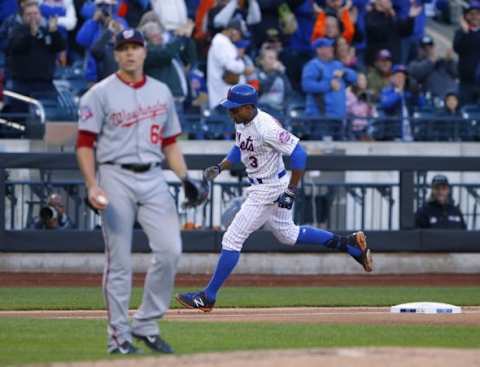
Unlike many other divisions in 2015, the National League East featured two clear playoff-worthy teams, while the rest of the division was mired in mediocrity. The New York Mets enjoyed a spectacular run to the postseason on the back of Yoenis Cespedes and an elite starting rotation, while the Washington Nationals failed to live up to expectations – and seemingly wasted a breakout season from Bryce Harper.
The Philadelphia Phillies, Atlanta Braves and Miami Marlins all suffered through misery-filled seasons, with hopes of discovering a star player within their farm systems.
This season doesn’t figure to be much different than 2015. The Mets retained a solid core by re-signing Cespedes to a three-year deal worth $75 million, and adding veteran second baseman Neil Walker to replace departed postseason hero Daniel Murphy.
The Nationals struck out with several top free agents, including Cespedes, but still boast a dangerous lineup and solid pitching rotation.
Meanwhile, the Phillies have gone into full-rebuild mode, but saw the emergence of power bat Maikel Franco and potential ace Aaron Nola toward the end of 2015. Healthy seasons from Giancarlo Stanton and Christian Yelich can propel the Marlins offense, but they have a lot of question marks throughout the roster.
The Braves boasts a strange mix of veteran talent and young potential impact players – but traded ace Shelby Miller for last year’s number one pick, Dansby Swanson, which will negatively impact their immediate future.
The NL East will likely see a heated race between the Mets and Nationals down to the end of the season, but there’s a chance the Marlins can make some noise under the direction of new manager Don Mattingly. Here’s our predictions for how things will shake out in the NL East in 2016.
Next: 5. Atlanta Braves
5. Atlanta Braves
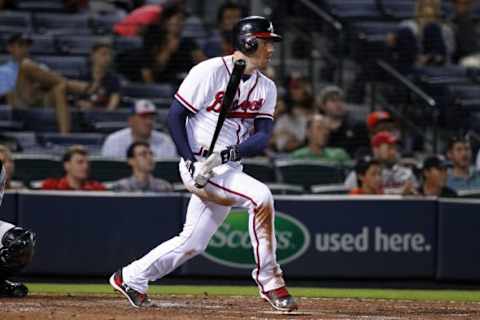
Projected Record: 65-97
Key Additions: SS Erick Aybar, OF Ender Inciarte, SS Dansby Swanson (prospect), RHP Aaron Blair (prospect)
Key Subtractions: RHP Shelby Miller, SS Andrelton Simmons, LHP Mike Minor, OF Cameron Maybin
Biggest Strength: Contact hitting
Biggest Weakness: Lack of impact talent
As the Atlanta Braves enter the stages of a full rebuild, it looks as if 2016 will be another trying season for a team searching for direction. Led by Freddie Freeman and Julio Teheran, the Braves are short on marquee talent to build around.
After trading away star pitcher Shelby Miller and defensive anchor Andrelton Simmons, the team did gain a collection of young talent that should arrive within a few seasons – including last year’s number one overall pick in the Amateur Draft, shortstop Dansby Swanson.
But there’s not much to be excited about on the current roster. The team added Erick Aybar to hold over the shortstop position until Swanson is ready, and acquired Ender Inciarte to take over centerfield duties. Freeman will once again be expected to do the heavy lifting in terms of producing runs, and it could be another down year average-wise for the first baseman.
Since 2013, Freeman has seen a decline in his batting average in each season – from .319 in 2013, to .288 in 2014, to .276 in 2015. While his overall slash line of .276/.370/.471 with 18 home runs and 66 RBI in only 118 games was solid, it’s clear he needs more protection lower in the lineup.
That protection could come in the form of recent Cuban signee Hector Olivera, who will make the move to left field this season. Olivera played decent ball in only 24 major league games last season – hitting .253/.310/.405 with a 13.8 strikeout percentage – but is expected to make a big jump this season as he fully adjusts to life in the majors. One cause for concern, though, was his low walk rate of 5.8 percent last season.
The rest of the lineup is relatively mediocre. Inciarte can provide a spark out of the leadoff spot after hitting .303 with a .338 OBP last season, but that was in a strong Arizona lineup. Second baseman Jace Pederson could take some steps forward this season, while veterans Nick Markakis and Erick Aybar will most likely produce at their typical rates.
Third baseman Adonis Garcia can provide some pop after hitting 10 home runs in 2015, but his ability to consistently get on base is a question mark.
Atlanta’s pitching isn’t much better. Behind Julio Teheran – who is coming off a down year – there aren’t any proven major league options. Bud Norris will provide a veteran presence, but Matt Wisler and Mike Foltynewicz have yet to prove themselves. The two, however, will likely be able to play the entire season with the major league club barring any injuries or serious problems.
The bullpen is highlighted by new closer Arodys Vizcaino, who pitched to a smooth 1.60 ERA in 36 games last season, but the rest is lacking depth.
While the Braves could make a run at some point, it would take a lot for their young talent and veterans to all produce at a consistently high level.
Next: 4. Philadelphia Phillies
4. Philadelphia Phillies
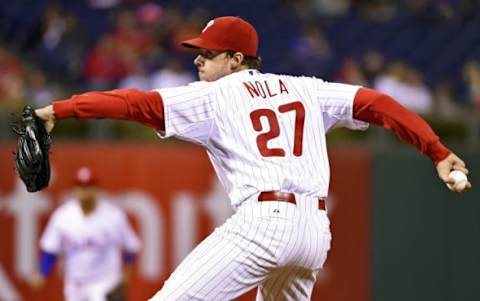
Projected Record: 66-96
Key Additions: RHP Jeremy Hellickson, OF Peter Bourjos, RHP Charlie Morton, RHP Mark Appel (prospect)
Key Subtractions: LHP Cliff Lee, RHP Ken Giles
Biggest Strength: Potential
Biggest Weakness: Pitching depth
The Philadelphia Phillies have been among baseball’s worst teams over the past few seasons for a variety of reasons, but mainly because of their unwillingness to devote themselves to a full rebuild.
However, the Phillies’ mindset changed mid-season when they traded away beloved second baseman Chase Utley, ace Cole Hamels and disgruntled closer Jonathan Papelbon – and subsequently ousted general manager Ruben Amaro Jr. later in the season.
Along with top shortstop prospect J.P. Crawford, the Phillies farm system is now loaded with talent – it may not be premiere, ticket-selling talent yet, but it’s talent nonetheless. As for the major league roster, the team actually has some above-average pieces that could play well enough to fend off the prospects for another season.
The key to the Phillies offensive success will be the rise of young third baseman Maikel Franco. The 23-year old made a big impact during his second stint with the team, slashing .280/.343/.497 to go along with 14 home runs and 50 RBI in just 80 games.
Despite a season-ending injury, Franco’s future looks extremely bright. His 7.8 walk percentage and 15.5 strikeout percentage show his advanced approach at the plate – and his walks should increase as he establishes himself. Franco’s main fault is in his defense at third base (-17.0 UZR/150), so a transition to first base may be in order at some point.
The rest of the lineup will depend on a successful sophomore campaign from centerfielder Odubel Herrera, who hit .297 and stole 16 bases in his first major league season. Another potential impact piece is the aforementioned Crawford – who could see a taste of action with the big league club at some point this season.
As for the pitching rotation, Aaron Nola will be relied upon to become the team’s No. 1 starter after an impressive rookie season despite being drafted just a year before. Nola posted a 3.59 ERA and 7.88 strikeouts per nine innings while only walking 2.88 batters per nine. Veterans Jeremy Hellickson and Charlie Morton provide a solid 2-3 duo, but the fourth and fifth starter positions remain unclear. If Mark Appel can get off to a strong start, he could be in the majors by June.
The Phillies’ bullpen likely will be an issue for the team all season after trading away Ken Giles this offseason. At the very least this season, the Phillies will see some action from their top prospects while flipping any veteran pieces performing well by the deadline. The balance of their lineup and top three starters keeps them just ahead of the Braves, too.
Next: 3. Miami Marlins
3. Miami Marlins
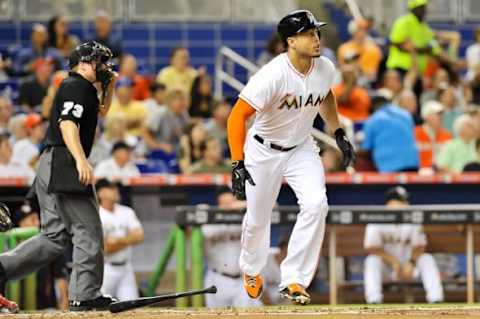
Projected Record: 77-83
Key Additions: LHP Wei-Yin Chen, 3B Chris Johnson
Key Subtractions: RHP Henderson Alvarez, 3B Casey McGehee
Biggest Strength: Balanced lineup
Biggest Weakness: Starting pitching
The Miami Marlins might be the most intriguing team in the NL East. They could either be a very solid ball club this season or fall apart on the weakness of their pitching.
With a strong lineup led by superstar Giancarlo Stanton, the team has enough complementary pieces to score plenty of runs. Despite only scoring 3.78 runs per game last season, the return of key lineup pieces will change that. But behind Jose Fernandez in the pitching rotation, there’s a lot of question marks.
Assuming Stanton can stay healthy this season, the Marlins offense should be above average – as Stanton mashed 27 home runs in only 74 games last season.
Miami’s outfield was once considered one of the best in the game, but after a down year from Marcell Ozuna – which almost saw him ousted from the organization – the team had to depend on production from bench players. This season, if Ozuna can bounce back, he and Yelich will create a very solid tandem in left and center field as power and contact hitters.
The league’s newest $50 million dollar man, Dee Gordon, as well as Adeiny Hechavarria will likely provide strong seasons at the plate and in the infield – as the two slashed .333/.359/.418 and .281/.315/.374, respectively.
Gordon also swiped 58 bags, which could be a game changer for a team reliant on power. First baseman Justin Bour will take over full-time duties and is expected to provide a lot of pop (23 HR in 2015) behind Stanton.
As for the pitching rotation, Jose Fernandez will most likely turn in another Cy Young worthy season – assuming, of course, that he stays healthy. He has been oft-injured in his short time in the major leages.
Behind him will be Wei-Yin Chen, after the lefty signed a five-year, $80 million dollar deal. Chen’s career ERA of 3.72 and only 2.19 BB/9 prove he’ll be a solid number two. After him, though, the rotation has several holes.
Letting Henderson Alvarez go was a questionable move, as, despite his struggles last season, he posted a 2.65 ERA just two seasons ago and has proven himself as a solid ground-ball pitcher.
Without Alvarez, some combination of Jarred Cosart, Tom Koehler and likely Adam Conley will make up the rest of the rotation. But those three have yet to prove themselves as consistent, winning pitchers, and could they very well struggle at keeping the Marlins in games. Top prospect Tyler Kolek isn’t ready for the majors yet, but could make an appearance at some point in 2016.
A trade in the near future for starting pitching seems inevitable if the Marlins get off to a hot start – which, with their offense, is a very real possibility.
Next: 2. Washington Nationals
2. Washington Nationals
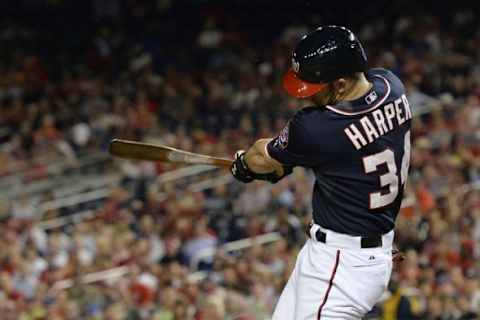
Projected Record: 89-73
Key Additions: 2B Daniel Murphy, OF Ben Revere,
Key Subtractions: RHP Jordan Zimmermann, RHP Doug Fister, CF Denard Span, 3B Yunel Escobar, RHP Drew Storen
Biggest Strength: Mix of talented veterans and young players
Biggest Weakness: Pitching depth
Despite losing several key contributors from the 2015 season, the Washington Nationals once again enter 2016 with high expectations. With Bryce Harper establishing himself as arguably the best player in MLB after a season that saw him hit .330 with a 1.109 OPS and 42 home runs, the Nationals offense has its biggest weapon for years to come.
Max Scherzer pitched his way to another dominant season at the front-end of the rotation, and Stephen Strasburg looks poised for a true breakout season in a contract year.
To take some of the pressure off Harper, the Nats will heavily rely on a bounce-back season from third baseman Anthony Rendon and a breakout year from top prospect Trea Turner. Rendon was limited to only 80 games in 2015 and only hit .264, but is just two years removed from a season in which he hit 21 home runs and managed a .824 OPS.
Turner will likely replace the departed Ian Desmond as the starting shortstop after hitting .314 with the Nationals’ Triple-A affiliate in 2015 – he also struggled to the tune of a .225 average in 25 games with the Nationals last season. Healthy seasons from Jayson Werth and Ryan Zimmerman would be a huge plus, while Ben Revere should slot in nicely to replace Denard Span.
The rotation, unlike in year’s past, could become a cause for concern if the No. 4 and 5 starters don’t produce. Gio Gonzalez is poised for yet another solid season, but Tanner Roark was bounced between the rotation and bullpen last year. The slotted fifth starter, Joe Ross, is largely unproven despite posting a 3.64 ERA in 13 starts last season.
The bullpen, now without the disgruntled Drew Storen, should be solid once again as Jonathan Papelbon can feel secure in his role as closer.
Most of the Nationals’ success this season will depend on the lineup’s production around Harper – and if they manage to produce at a high level, the team could be very scary late in the season.
Next: 1. New York Mets
1. New York Mets
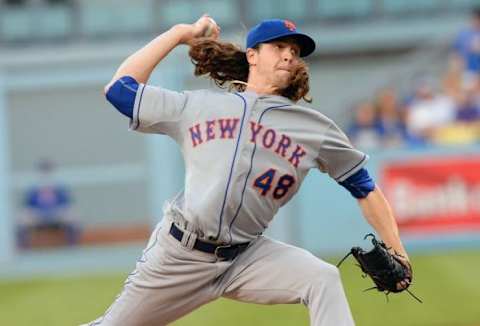
Projected Record: 95-67
Key Additions: 2B Neil Walker, SS Asdrubal Cabrera
Key Subtractions: 2B Daniel Murphy, RHP Tyler Clippard, 3B Juan Uribe, LF Michael Cuddyer
Biggest Strength: Pitching rotation
Biggest Weakness: David Wright’s health
The only move the New York Mets needed to make this offseason was re-signing star outfielder Yoenis Cespedes – and that’s exactly what they did. Now entering 2016, fresh off a World Series appearance, the Mets are poised to take the league by storm with their historically good starting rotation and surprisingly balanced lineup.
The addition of Cespedes last season gave the Mets a huge spark, and after learning he was interested in a return to Queens, a motivated version of the outfielder could provide that kind of production throughout the course of the entire season. Of course, he’ll be playing centerfield – where he was less than spectacular on defense with a -14.0 UZR/150 – but his bat will make up for any defensive lapses.
Michael Conforto is poised for a breakout season in left field after posting an OPS of .841 in 50 games last season, while Curtis Granderson should be solid in right field. The infield has a new look with the likes of shorstop Asdrubal Cabrera and second baseman Neil Walker – but those two should play equally well to their successors.
A healthy season from Travis D’Arnaud could be huge in terms of elevating the Mets’ offense to elite levels, as he hit .268 with 12 home runs in only 67 games last year.
The health of David Wright could be an issue after he was limited to 38 games last season, but the addition of Cabrera provides the team with some depth in the case of an injury to their star third baseman.
More from Call to the Pen
- Philadelphia Phillies, ready for a stretch run, bomb St. Louis Cardinals
- Philadelphia Phillies: The 4 players on the franchise’s Mount Rushmore
- Boston Red Sox fans should be upset over Mookie Betts’ comment
- Analyzing the Boston Red Sox trade for Dave Henderson and Spike Owen
- 2023 MLB postseason likely to have a strange look without Yankees, Red Sox, Cardinals
Not much needs to be said about the pitching staff, as Jacob deGrom and Matt Harvey will provide an elite one-two punch while Steven Matz, Noah Syndergaard and Bartolo Colon round out an impressive group. By mid-season, the rotation will get even stronger with the return of Zack Wheeler. The bullpen is loaded with talent from top to bottom and has no pressing concerns.
There’s a lot to like about the Mets this season – and they could be in line for another World Series trip if everything falls into place.
The NL East isn’t as strong as other divisions in MLB, but features two teams poised to make a run at the postseason.